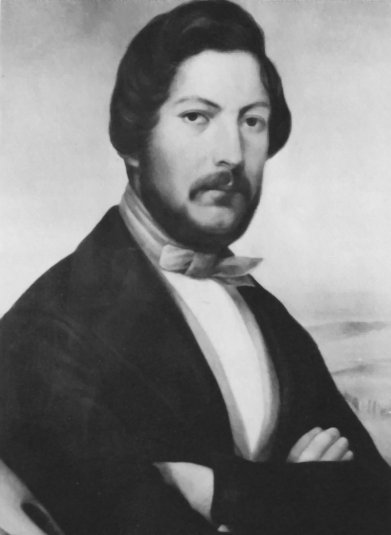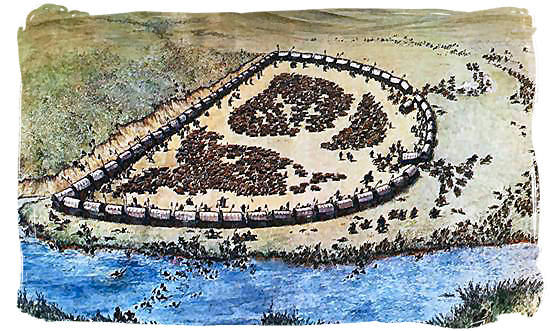
Posted on 12/24/2008 10:24:35 AM PST by mainestategop
Its the 170th anniversary of a pioneer story hardly anyone ever hears anymore. One of those stories about courageous men with nothing more than a bag of seeds, a hoe, hammer and musket, a pregnant wife and a horse come to stay. They fought off wild animals, hostile natives, outlaw bandits and other hardships to make the once desolate landscape a land of flowing milk and honey. The story you are about to read is one that hardly any American ever hears. Primarily because this story is not set in the wild untamed west of North America but in the wide open savannas of South Africa.
In the sixteenth and seventeenth centuries, the Dutch established colonies in South Africa and Madagascar to supply trading fleets heading towards its colonies in Indonesia. South Africa became more than just an outpost terminus, but a land where people could flee persecution similar to North America. The early pioneers or voortrekkers as they were later called were French Huguenots, British Puritans and Dutch reformists. From the beginning there were many hardships in the colonies.
In addition to later incidents of racial intolerance that would later give way to Apartheid, there was a lack of resources. Settlers decimated local ecology and lead to the extinction of several creatures such as the Dodo bird and left Madagascar a wasteland. In South Africa, Christian sects clashed over interpretation of scripture and with hostile native tribes such as the Zulu. Furthermore, Great Britain made incursions into South Africa driving many of the Dutch colonists or Boers as they were known further inland into Africa's unexplored and untamed wilderness.
In the nineteenth century, the Dutch Boers, who had embraced puritanism began to feel more and more threatened by influences from the outside. The enlightenment and the rise of humanism which became even more apparent with the arrival of British colonists and administrators. The British blockaded the harbor at Natal and prevent shipments of food and ammunition from reaching them. This motivated the Voortrekers even more to settle further into Natal.

The greatest obstacle facing the Vorrtrekers were the Zulus, lead by a brilliant leader named Dingaan kaSenzangakhona. The Voortrekers sent their leader Piet Retief along with 69 men to negotiate with Dingane to settle in an area of Natal that encompassed the southern region of Zululand. Dingane agreed in exchange for aiding the recovery of stolen cattle from an opposing tribe. Retief was in high spirits at the prospect of negotiating a land deal for his people with Dingaan. The party arrived back at the royal Zulu capital uMgundlovu on 3 February 1838. On the following day, a treaty was signed, whereby Dingaan ceded all the land south of the Thukela River, as far as the Mzimvubu River, in the Transkei, to the Voortrekkers
On 6 February, Retief and his party were treated to a farewell dance by the Zulu impis. They were told to leave their firearms outside the royal kraal. Little did they know that Dingaan suspected that the Voortekers had withheld some of the cattle. Suddenly, when the dancing had reached a frenzied climax, Dingaan leapt to his feet and shouted "Bambani aba thakathi!" Or, "Kill the wizards!" Unarmed and outnumbered, the men were totally overpowered and dragged away to a hill called kwaMatiwane, named after a chief who had been killed there. Retief and his men were savagely executed.

After this, the Zulus launched a ferocious attack against Voortreker settlements. Over 500 men women and children were killed. The Voortrekers were not deterred and asked for help from Andreis Pretorius to leave Cape colony to come to their aid against Dingane. Pretorius like Dingane was brilliant strategist and knew all the tricks and traps of the zulus had such as ambushing riders in narrow canyons.
On December 15th, the voortrekers crossed the Buffalo river and scouts reported an incoming force of Zulus lead by Dungaan. One of Pretorius' lieutenants, suggested riding out the attack but he felt it might be a trap and knew they could not outrun the force so he chose to camp at the Ncome river for a rear protection. The ox wagons were circled into what was known as a laager between which there were several removable barriers mad The of wood to prevent intruders from entering. The men were armed with rifles and two cannons.


On the morning of December 16th 1838, the Voortrekers awoke to the sight of over 10,000 Zulu. "all of Zululand sat there" said one witness. Before the battle commenced according to tradition, the settlers had made a vow to God that if He should deliver them, they would build a church in his name and in the name of their fallen leader Piet Retief and commemorate the day as a Sabbath.
During the first phase of the attack, the Zulu repeatedly and unsuccessfully attacked the laager. The attackers were hindered by a change introduced during Shaka's rule, which replaced most of the longer throwing spears with short stabbing spears. The stabbing spear provided obvious advantages in close combat over its longer cousin. Still, the settlers faced a barrage of throwing spears which the Zulu could throw over 50 feet.
A Zulu eyewitness said that their first charge was mowed down like grass by the single-shot Boer muskets. This is because the Voortrekkers had brought the full power of the firepower they had by having servants reload other muskets, allowing a single rifleman and a band of servants to fire approximately a shot every 5 seconds. Mackenzie claims that 200 indigenous servants looked after the horses and cattle and helped load muskets. It was a rare moment in South Africa's racially tense history that black and whites fought in unity against a common foe.
After two hours and four waves of attack, Pretorius ordered a group of horsemen to leave the encampment and engage the Zulu in order to disintegrate their formations. The Zulu withstood the charge for some time, but rapid losses led them to scatter. They hunted the Zulus for three hours.
When it was all over, Bantjes recorded that about 3,000 dead Zulu had been counted, and only three Trekkers with minor to moderate injuries among them Pretorius who had injured his hand by a spear while pursuing the fleeing Zulu. Four days after the battle, the commando arrived at the Zulu Capital which had been deserted and burned. The recovered the remains of Piet Retief and the other Voortrekers and buried them near where the Voortreker Memorial is. It is also there where they built their church.
The day of the Battle December 16th is a national holiday in South Africa known as the day of the vow. After 1994, president Nelson Mandela declared it the day of reconciliation.
Military historians are baffled by the great victory. Many point out that although Dungaan was a brilliant strategist, he made several errors. One was that he had relied more on close combat than ranged. The other is that he chose to attack during the day instead of at night. The Zulus were superstitious about attacking at night and during cloudy or foggy days. Others point out that the Laager defense hindered attacks against the Voortrekers. The wagons obstructed much of their throwing spears and the barriers they establish blocked them from entering. Many also point out that 3000 dead Zulus were not large enough and that less were killed.
Many however, especially those descended from the Voortrekers view the victory as a miracle. One story by a woman who aided in arming the settlers told of a cloud that hung over the Laager that was glowing and a voice came out assuring her safety. She noted that as she gathered ammunition, spears rained down in every direction yet she was not harmed.
It should also be noted that 30 years later, a Zulu force less than half the strength that fought against the band oof settlers annihilated an entire British column of the 24th foot regiment on the hills of Islhandwana. The British militery, the most powerful at the time and armed with the most modern in weaponry stood no chance against 4000 zulus and their march towards Natal was stopped only by a small platoon in the trade outpost of Rorke's drift and due to an attrition of supplies and exhaustion.
In the opinion of this writer, it was indeed a miracle as with other battles in history where small numbers overcame greater force. The Battles of bloody river, the battles of the past and the future whether it is D-Day, Midway, Ticonderoga, Rorke's drift, the Six day War, Thermopyle, Jericho, Waterloo, Stalingrad, Mons, Hastings, Agincourt, or others, divine providence is one force that arm chair generals, warlords and military historians need not leave out in the final outcome of great wars and battles.
And after centuries of fighting to gain a foothold in Africa the whites left and Africa, again, descends into darkness.
Yes I know. Its sad. Apartheid they had later was bad, but what’s going on now is even worse.

"Here we stand before the holy God of heaven and earth, to make a vow to Him that, if He will protect us and give our enemy into our hand, we shall keep this day and date every year as a day of thanksgiving like a sabbath, and that we shall erect a house to His honour wherever it should please Him, and that we also will tell our children that they should share in that with us in memory for future generations. For the honour of His name will be glorified by giving Him the fame and honour for the victory."

Not even Botha would have tolerated necklacing.
Rorkes drift doesn’t even come close to the spectacle of Blood River. They faced a force twice that big and the British army at Isandlwana couldn’t even match it.
Yeah I know. Not even Botha is as sick as the Mandelas, and yet the world over hails them as liberators!
Thanx.
history bump
Disclaimer: Opinions posted on Free Republic are those of the individual posters and do not necessarily represent the opinion of Free Republic or its management. All materials posted herein are protected by copyright law and the exemption for fair use of copyrighted works.